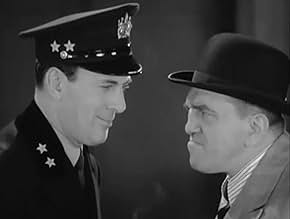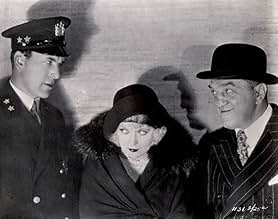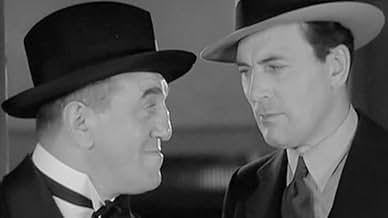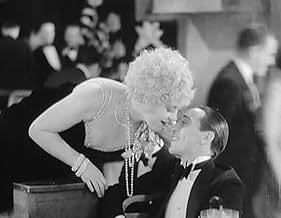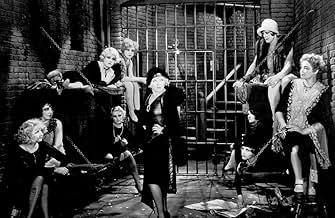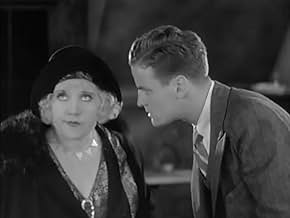CALIFICACIÓN DE IMDb
6.6/10
1.8 k
TU CALIFICACIÓN
Agrega una trama en tu idiomaAn honest police captain vows to bring down a powerful bootlegger who is protected by corrupt politicians and judges.An honest police captain vows to bring down a powerful bootlegger who is protected by corrupt politicians and judges.An honest police captain vows to bring down a powerful bootlegger who is protected by corrupt politicians and judges.
- Dirección
- Guionistas
- Elenco
- Nominado a 1 premio Óscar
- 3 premios ganados y 1 nominación en total
G. Pat Collins
- Patrolman Johnson
- (as Pat Collins)
George E. Stone
- Joe Scarsi
- (as George Stone)
Sam De Grasse
- District Attorney Welch
- (as Sam DeGrasse)
Richard 'Skeets' Gallagher
- Miller
- (as Skeets Gallagher)
Frank Austin
- Man at Funeral
- (sin créditos)
Walter Brennan
- Man on Street in Front of Barber Shop
- (sin créditos)
Jimmy Dime
- Rival Gang Lookout
- (sin créditos)
Jim Farley
- Detective
- (sin créditos)
Ruth Feldman
- Woman on stairs
- (sin créditos)
Sherry Hall
- Orchestra Leader
- (sin créditos)
Opiniones destacadas
If you've read some of my other comments, you'll know that I'm in the middle of watching all movies that received Academy Award nominations in the Academy's very first year, 1927-28. "The Racket" was one of three nominees for Best Picture, along with "Seventh Heaven" and "Wings," and though it's by far the least ambitious and "important" of the three, it's the one that I found to be most satisfying.
It's a quick, speedy little gangster thriller from Lewis Milestone about one committed cop's determination to see a crime lord brought to justice. It was based on a play, but Milestone does a terrific job of keeping things cinematic -- this movie moves, and that plus the fact that it's not long to begin with makes its running time go racing by.
Thomas Meighan, who apparently was a big name at the time but who is unfamiliar to me, plays the cop, while Louis Wolheim plays the gangster. Both are terrific, but both are upstaged, as is everyone else, by Marie Prevost (playing a character named, of all things, Helen Hayes) as surely one of the first memorable gangster molls. She gets a really good pre-Code line (if silent films can be said to have lines) about babies and storks that gives you one of those "could they really say things like that back then" moments that pre-Code movies always have.
As far as I know, this movie isn't available anywhere for legitimate viewing. I had to see it the same way I saw "Wings," by watching it in pieces on a site whose name I won't mention. Better catch it soon before someone takes it down.
Grade: A
It's a quick, speedy little gangster thriller from Lewis Milestone about one committed cop's determination to see a crime lord brought to justice. It was based on a play, but Milestone does a terrific job of keeping things cinematic -- this movie moves, and that plus the fact that it's not long to begin with makes its running time go racing by.
Thomas Meighan, who apparently was a big name at the time but who is unfamiliar to me, plays the cop, while Louis Wolheim plays the gangster. Both are terrific, but both are upstaged, as is everyone else, by Marie Prevost (playing a character named, of all things, Helen Hayes) as surely one of the first memorable gangster molls. She gets a really good pre-Code line (if silent films can be said to have lines) about babies and storks that gives you one of those "could they really say things like that back then" moments that pre-Code movies always have.
As far as I know, this movie isn't available anywhere for legitimate viewing. I had to see it the same way I saw "Wings," by watching it in pieces on a site whose name I won't mention. Better catch it soon before someone takes it down.
Grade: A
I am watching it right now on TCM. It has been digitally restored and a new soundtrack added. The music is excellent. I was sure it was 'period' until I saw the credits, which are rolling as I type.
Marie Prevost is amazing, she dominates every scene in which she appears. Her expressions and body language are astounding. It helps you understand what silent movie acting is all about.
This was a Howard Hughes production. I believe the picture is longer than 60 minutes, though.
The University of Nevada at Las Vegas is credited with this restoration project. They did a great job. I love this movie.
Marie Prevost is amazing, she dominates every scene in which she appears. Her expressions and body language are astounding. It helps you understand what silent movie acting is all about.
This was a Howard Hughes production. I believe the picture is longer than 60 minutes, though.
The University of Nevada at Las Vegas is credited with this restoration project. They did a great job. I love this movie.
Like TWO ARABIAN KNIGHTS and THE MATING CALL, this film has now been restored by UNLV (which found the prints of these films once thought lost in an archive of producer Howard Hughes' possessions) in cooperation with Flicker Alley.
Lewis Milestone, who had just directed TWO ARABIAN KNIGHTS for Hughes, brought much of the same sense of friendly rivalry between the two leads to this picture, as well as the same co-star, Louis Wolheim. All the elements of many a subsequent gangster picture are here: The close personal relationship between the antagonists (gang boss Wolheim and cop Thomas Meighan); the kid brother whom the gangster wants to shelter from the rackets (George E. Stone, soon to appear in LITTLE CAESAR and many another gangster flick), but who runs afoul of a tough little chanteuse (Marie Prevost). Mob bosses cavorting in lavish nightclubs, overwrought gangland funerals, crooked politicians, a wet-behind-the-ears reporter with two old pros as a chorus: it's all here.
Enough of the action takes place in a run-down precinct house to belie the story's stage origins, but there's plenty of action, including a shootout between two rival gangs, to keep things hopping.
Lewis Milestone, who had just directed TWO ARABIAN KNIGHTS for Hughes, brought much of the same sense of friendly rivalry between the two leads to this picture, as well as the same co-star, Louis Wolheim. All the elements of many a subsequent gangster picture are here: The close personal relationship between the antagonists (gang boss Wolheim and cop Thomas Meighan); the kid brother whom the gangster wants to shelter from the rackets (George E. Stone, soon to appear in LITTLE CAESAR and many another gangster flick), but who runs afoul of a tough little chanteuse (Marie Prevost). Mob bosses cavorting in lavish nightclubs, overwrought gangland funerals, crooked politicians, a wet-behind-the-ears reporter with two old pros as a chorus: it's all here.
Enough of the action takes place in a run-down precinct house to belie the story's stage origins, but there's plenty of action, including a shootout between two rival gangs, to keep things hopping.
As it has just been recovered and digitized by University of Nevada at Las Vegas and Turner Classic Movies along with the rest of Howard Hughes' classic silent movies, the people of today will finally get to see this great movie. A movie about prohibition and the mafia, made at the same time it was all going on. Idealizing the mafia before the Godfather was even thought of. Although it may be silent, it shows detail on the corruption of the mob with the police force and government officials, and not to mention the costumes of the film were obviously fitting for the time period, and used common "gangster" themes, such as the pinstriped suit with fedora and the cigar. The production quality is very good for the time, with what equipment they had to work with. The stereotypical choppiness of the frames from 20's movies rarely occurs, except when there is much fast action. Turner also did a good job digitizing this, as the film quality is still high. I recommend that people see this, albeit short, it gives a good idea about the movies of the times. Along with "Two Arabian Nights", also produced by Howard Hughes.
Sadly this film was made available long years (like 50) after the giants of the early gangster films were available---Little Cesear and The Public Enemy,so it missed the true acclaim it probably deserves.
Being made during Prohibition, and during the less "glamourous" studio period (but with an excellent director, fast paced script and great supporting cast) it has the immediate feel of the time---when the policeman hero is exiled to the country it IS the country, and the character actors shine here--especially the incandescent and tragic Marie Prevost as the platinum blonde chanteuse, Helen Hayes. She is absolutely wonderful as a complete jazz baby flinging herself into the arms of the nearest well heeled heel available, her desperation clearly visible under the surface. This performance is subtle in it's (Mae West) undertones, but she anticipates the bright gaudy generous hearted vulgarity of Jean Harlow by several years. She has a huge range with her hideous fox fur collared cape, her cigarette, and her bits of business with her props--she has the stage presence of her character's name Helen Hayes, but she is much more naughty and fun to watch. She cynically analyzes the lead villain's fear of women, and stands up to him, leveraging his fear in the face of his men, and lays her neck on the line. At the same time, she desperately digs for gold, playing hard to get with the gangster's weak spot, his younger, ratty brother. (George Stone in an early role). The scene where she rips off her "act" costume, and jumps on an upright piano and has the musician's wheel her over to the gangster's brother's "birthday party" is pure gold.
How sad that she died so horribly in real life, but how wonderful that her performance is preserved here in all it's splendor! While Thomas Meighan is the same noble stiff as a board hero of DeMille's society matrons movies of the l920s he also shows range in a "good cop" role with a noir twist at the end, making this one of the first contemporary gangster movies. George E Stone, who would go on to play everyone's favorite rat for the next 40 years is here in a juvenile lead, scummy and detestible as ever, and the perpetually bombed and wisecracking reporter Skeets Gallegar gets all the fast paced and best lines. God Bless Ted Turner for not letting this one get lost! Cannot wait for it to come out on DVD for all true noir and gangster film archaeologist's to enjoy! We can only wonder what a kick it would be in film histories of today if this had been available at the same time as The Public Enemy , Little Ceasar and other seminal works. If you are a "Merry Gangster Historian" go for it!
Being made during Prohibition, and during the less "glamourous" studio period (but with an excellent director, fast paced script and great supporting cast) it has the immediate feel of the time---when the policeman hero is exiled to the country it IS the country, and the character actors shine here--especially the incandescent and tragic Marie Prevost as the platinum blonde chanteuse, Helen Hayes. She is absolutely wonderful as a complete jazz baby flinging herself into the arms of the nearest well heeled heel available, her desperation clearly visible under the surface. This performance is subtle in it's (Mae West) undertones, but she anticipates the bright gaudy generous hearted vulgarity of Jean Harlow by several years. She has a huge range with her hideous fox fur collared cape, her cigarette, and her bits of business with her props--she has the stage presence of her character's name Helen Hayes, but she is much more naughty and fun to watch. She cynically analyzes the lead villain's fear of women, and stands up to him, leveraging his fear in the face of his men, and lays her neck on the line. At the same time, she desperately digs for gold, playing hard to get with the gangster's weak spot, his younger, ratty brother. (George Stone in an early role). The scene where she rips off her "act" costume, and jumps on an upright piano and has the musician's wheel her over to the gangster's brother's "birthday party" is pure gold.
How sad that she died so horribly in real life, but how wonderful that her performance is preserved here in all it's splendor! While Thomas Meighan is the same noble stiff as a board hero of DeMille's society matrons movies of the l920s he also shows range in a "good cop" role with a noir twist at the end, making this one of the first contemporary gangster movies. George E Stone, who would go on to play everyone's favorite rat for the next 40 years is here in a juvenile lead, scummy and detestible as ever, and the perpetually bombed and wisecracking reporter Skeets Gallegar gets all the fast paced and best lines. God Bless Ted Turner for not letting this one get lost! Cannot wait for it to come out on DVD for all true noir and gangster film archaeologist's to enjoy! We can only wonder what a kick it would be in film histories of today if this had been available at the same time as The Public Enemy , Little Ceasar and other seminal works. If you are a "Merry Gangster Historian" go for it!
¿Sabías que…?
- TriviaOnly one copy of the film is known to have survived. It was long thought lost before being located in Howard Hughes' film collection after his death. The film was restored and preserved by the University of Nevada, Las Vegas film department. The restored copy is frequently shown on Turner Classic Movies in the US.
- ErroresMcQuigg's holster is embossed with his name and rank, but it also says CITY OF followed by a blank space.
- Citas
Cub Reporter Ames: I told you not to look after me... Why did you do it?
Helen Hayes: Because - -- because you affect me like a mammy song.
- Versiones alternativasIn 2004, The University of Nevada, Las Vegas and Flicker Alley, LLC copyrighted a new digital version with a new orchestral score composed, arranged and conducted by Robert Israel. It was produced by Jeffery Masino and runs 84 minutes.
- ConexionesReferenced in Public Enemies: The Golden Age of the Gangster Film (2008)
Selecciones populares
Inicia sesión para calificar y agrega a la lista de videos para obtener recomendaciones personalizadas
- How long is The Racket?Con tecnología de Alexa
Detalles
- Tiempo de ejecución1 hora 24 minutos
- Color
- Mezcla de sonido
- Relación de aspecto
- 1.33 : 1
Contribuir a esta página
Sugiere una edición o agrega el contenido que falta

Principales brechas de datos
By what name was The Racket (1928) officially released in India in English?
Responda
